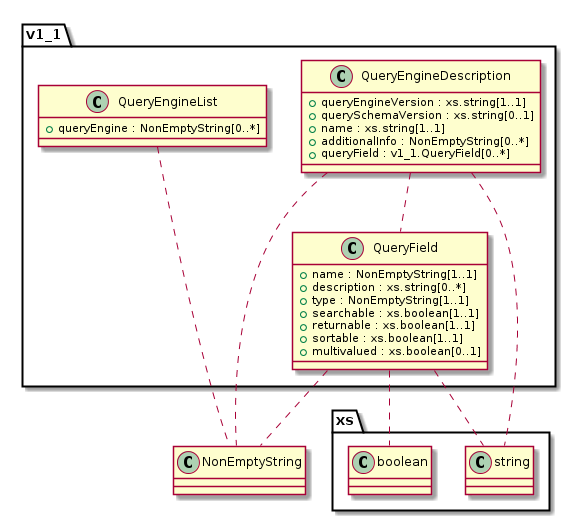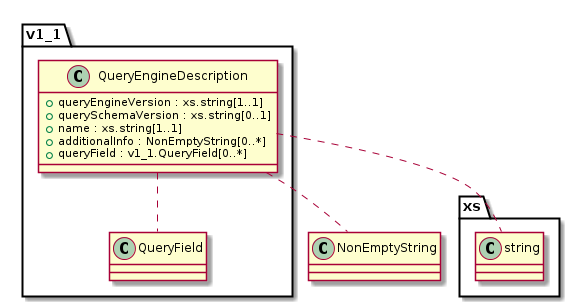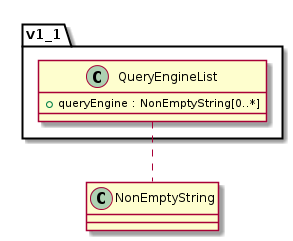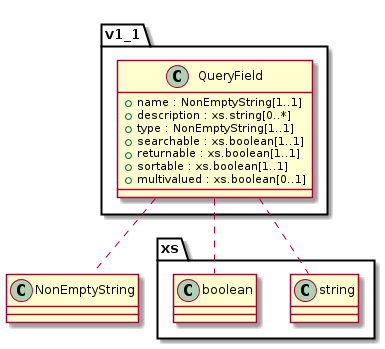Data Types in CICore¶
Versions
Quick Reference

-
class
v1_1.Types.QueryEngineDescription¶ Describes a query engine that can be used to search content on the node. Query engines may be general purpose or specialized for particular communities or domains.
-
queryEngineVersion¶ Type: xs.string
The version of the underlying query engine. Used by clients to determine possible compatibility concerns or features available.
-
additionalInfo¶ Type:
Types.NonEmptyStringAn optional human readable description of the query engine. This can be used to describe any special capabilities or intended uses for the query engine. For example, a query engine may be tuned to suit a particular audience or domain as opposed to providing a general purpose discovery mechanism.
This field may also contain links to additional information about the query engine, such as documentation for the search syntax provided by the query engine implemntors.
-
queryField¶ Type:
v1_1.Types.QueryFieldA list of query fields supported by the query engine.
<xs:complexType xmlns:xs="http://www.w3.org/2001/XMLSchema" name="QueryEngineDescription"> <xs:sequence> <xs:element name="queryEngineVersion" type="xs:string" minOccurs="1" maxOccurs="1"> </xs:element> <xs:element name="querySchemaVersion" type="xs:string" minOccurs="0" maxOccurs="1"> </xs:element> <xs:element name="name" type="xs:string" minOccurs="1" maxOccurs="1"> </xs:element> <xs:element name="additionalInfo" type="d1:NonEmptyString" minOccurs="0" maxOccurs="unbounded"> </xs:element> <xs:element name="queryField" type="d1_v1.1:QueryField" minOccurs="0" maxOccurs="unbounded"> </xs:element> </xs:sequence> </xs:complexType>

-
-
class
v1_1.Types.QueryEngineList¶ A list of query engine names that indicate the possible values for CNRead.getQueryEngineDescription and CNRead.query REST API endpoints.
-
queryEngine¶ Type:
Types.NonEmptyStringThe name of a queryEngine. This value will be used as a path element in REST API calls and so should not contain characters that will need to be escaped.
<xs:complexType xmlns:xs="http://www.w3.org/2001/XMLSchema" name="QueryEngineList"> <xs:sequence> <xs:element name="queryEngine" type="d1:NonEmptyString" minOccurs="0" maxOccurs="unbounded"> </xs:element> </xs:sequence> </xs:complexType>

-
-
class
v1_1.Types.QueryField¶ -
name¶ Type:
Types.NonEmptyStringThe name of the field as used programmatically when constructing queries or other rferences to the field.
-
description¶ Type: xs.string
An optional, repeatable, brief description of the field that can be used to help guide developers or end users in appropriate use of the field. May for example, contain a links to additional documentation.
-
type¶ Type:
Types.NonEmptyStringThe type of the field, expressed in the language peculiar to the query engine being described.
-
searchable¶ Type: xs.boolean
Indicates if the field may be used in constructing queries (as opposed to only appearing in results)
-
returnable¶ Type: xs.boolean
Indicates if the field values may be returned in search results.
-
sortable¶ Type: xs.boolean
Indicates if the field can be used for sorting results.
-
multivalued¶ Type: xs.boolean
Indicates if the field may contain multiple values. Some query engines such as SOLR support this capability.
<xs:complexType xmlns:xs="http://www.w3.org/2001/XMLSchema" name="QueryField"> <xs:sequence> <xs:element name="name" type="d1:NonEmptyString" minOccurs="1" maxOccurs="1"> </xs:element> <xs:element name="description" type="xs:string" minOccurs="0" maxOccurs="unbounded"> </xs:element> <xs:element name="type" type="d1:NonEmptyString" minOccurs="1" maxOccurs="1"> </xs:element> <xs:element name="searchable" type="xs:boolean" minOccurs="1" maxOccurs="1"> </xs:element> <xs:element name="returnable" type="xs:boolean" minOccurs="1" maxOccurs="1"> </xs:element> <xs:element name="sortable" type="xs:boolean" minOccurs="1" maxOccurs="1"> </xs:element> <xs:element name="multivalued" type="xs:boolean" minOccurs="0" maxOccurs="1"> </xs:element> </xs:sequence> </xs:complexType>

-
